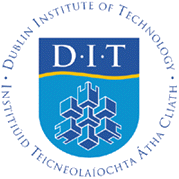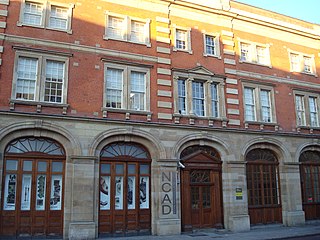
A college is an educational institution or a constituent part of one. A college may be a degree-awarding tertiary educational institution, a part of a collegiate or federal university, an institution offering vocational education, or a secondary school.
A Bachelor of Education (B.Ed.) is an undergraduate professional degree which prepares students for work as a teacher in schools. In some countries such as Tanzania and Kenya, additional tasks like field work and research are required in order for the student to be fully qualified to teach. It may also be accompanied with or followed by tests for licenses or certifications required for teachers in some areas.

Dublin City University is a university based on the Northside of Dublin, Ireland. Created as the National Institute for Higher Education, Dublin in 1975, it enrolled its first students in 1980, and was elevated to university status in September 1989 by statute.
An Institute of Technology (IT) is a type of higher education college found in Ireland. There are a total of fourteen colleges that use the title of Institute of Technology, which were created from the late 1960s and were formerly known as Regional Technical Colleges. The exception to this was Dublin Institute of Technology which emerged independently of the Regional College system.

Dublin Institute of Technology was a major third-level institution in Dublin, Ireland. On 1 January 2019 DIT was dissolved and its functions were transferred to the Technological University Dublin, as TU Dublin City Campus. The institution began with the establishment of the first technical education institution in Ireland, in 1887, and progressed through various legal and governance models, culminating in autonomy under a statute of 1992.

The Institute of Technology, Carlow was an institute of technology, located in Carlow, Ireland. The institute had campuses in Carlow, Wexford, and Wicklow, as well as a part-time provision elsewhere in Ireland. Along with the Waterford Institute of Technology, the institute was dissolved on 1 May 2022 and was succeeded by the South East Technological University.

Cork Institute of Technology was an institute of technology, located in Cork, Ireland. Upon its dissolution, the institute had 17,000 students studying in art, business, engineering, music, drama and science disciplines. The institute had been named as Institute of Technology of the Year in The Sunday Times University Guide for Ireland on numerous occasions. On 1 January 2021, the institute merged with the Institute of Technology, Tralee to become the Munster Technological University, Ireland's second technological university.

Institute of Technology, Blanchardstown (ITB) established in 1999, was a third-level institution, now amalgamated into Technological University Dublin. It was the last-founded Institute of Technology in Ireland. The campus is located within the Business and Technology Park on Blanchardstown Road North, about 15 km from Dublin City and close to the N3. This is situated in the townland of Buzzardstown, in the civil parish of Mulhuddart.

The Higher Education and Training Awards Council (HETAC), the legal successor to the National Council for Educational Awards (NCEA), granted higher education awards in Ireland beyond the university system from 2001 to 2012. HETAC was created in 2001, subject to the policies of the National Qualifications Authority of Ireland, and, specifically, granted qualifications at many Institutes of Technology and other colleges. HETAC was dissolved and its functions were passed to Quality and Qualifications Ireland (QQI) on 6 November 2012.
A Bachelor of Medicine, Bachelor of Surgery is an undergraduate medical degree awarded by medical schools in countries that follow the tradition of the United Kingdom. The historical degree nomenclature states that they are two separate undergraduate degrees. In practice, however, they are usually combined as one and conferred together, and may also be awarded at graduate-level medical schools. It usually takes five to six years to complete this degree.

Third-level education in the Republic of Ireland includes all education after second-level, encompassing higher education in universities and colleges and further education on Post Leaving Certificate (PLC) and other courses. The degree-awarding institutions which can grant awards at all academic levels are the University of Dublin, National University of Ireland, University of Limerick, Dublin City University, Technological University Dublin, the Royal College of Surgeons in Ireland, Munster Technological University and Technological University of the Shannon: Midlands Midwest, as well as St. Patrick's College, Maynooth, and then a State agency, Quality and Qualifications Ireland, can grant awards in other institutions directly, or delegate the authority to do so. and University of Limerick. The King's Inns of Dublin has a limited role in education specialising in the preparation of candidates for the degree of barrister-at-law to practice as barristers. Medical schools in Ireland also have particular regulation. There were seven establishments of higher education within Ireland ranked among the top 500 universities worldwide by the Times Higher Education Supplement in 2008.
The Postgraduate Certificate in Education (PGCE/PGCertEd) is a one- or two-year higher education course in England, Wales and Northern Ireland which provides training in order to allow graduates to become teachers within maintained schools. In England, there are two routes available to gaining a PGCE – either on a traditional university-led teacher training course or school-led teacher training.

Our Lady of Mercy College, Carysfort was a College of Education in Dublin, Ireland from its foundation in 1877 until its closure in 1988. Educating primary school teachers, and located in a parkland campus in Blackrock, it was a recognised college of the National University of Ireland from April 1975. The site is now the premises of the Michael Smurfit Graduate Business School, part of University College Dublin.

Griffith College Dublin (GCD) is one of the longest-established private third level colleges in Dublin, Ireland.

The National College of Art and Design (NCAD) is Ireland's oldest art institution, offering the largest range of art and design degrees at undergraduate and postgraduate level in the country. Originating as a drawing school in 1746, many of the most important Irish artists, designers and art educators have studied or taught in the college. NCAD has always been located in central Dublin, and in 1980 it relocated to the historic Liberties area. The College has around 950 full-time students and a further 600 pursuing part-time courses, and NCAD's students come from more than forty countries. NCAD is a Recognised College of University College Dublin. It is also a member of the European League of Institutes of the Arts.

Marino Institute of Education is an Irish College of Education, an associated College of Trinity College Dublin. It is located on Griffith Avenue, Dublin 9. Marino Institute of Education is focused on providing education courses. Its degrees and diplomas are awarded by the University of Dublin, Trinity College. Marino Institute of Education follows the tradition of care through education established by Edmund Rice. Marino Institute of Education comprises the College of Education, the Conference Centre, Continuing Professional Development (CPD) and various support services.
The Milltown Institute of Theology and Philosophy was a Jesuit-run institution of higher education and research, located in Dublin, Ireland. It was located in Ranelagh, County Dublin.

Educate Together is an educational charity in Ireland which is the patron body to "equality-based, co-educational, child centred, and democratically run" schools. It was founded in 1984 to act as the patron body for the new multidenominational schools that opened after the establishment of the Dalkey School Project. As of 2019, Educate Together is the patron of 90 national schools in Ireland. In 2014 three Educate Together Second Level Schools opened in Dublin 15, Drogheda and Lucan along with the first Educate Together school outside Ireland, in Bristol in the United Kingdom. In joint patronage with Kildare and Wicklow ETB, Educate Together opened another second-level school, Celbridge Community School, in 2015.

Tertiary education in New Zealand is provided by universities, institutes of technology and polytechnics, private training establishments, industry training organisations, and wānanga. It ranges from informal non-assessed community courses in schools through to undergraduate degrees and research-based postgraduate degrees. All post-compulsory education is regulated within the New Zealand Qualifications Framework, a unified system of national qualifications for schools, vocational education and training, and 'higher' education. The New Zealand Qualifications Authority (NZQA) is responsible for quality assuring all courses and tertiary education organisations other than universities. Under the Education Act 1989, The Committee on University Academic Programmes (CUAP) and the Academic Quality Agency (AQA) have delegated authority for quality assurance of university education. The Tertiary Education Commission (TEC) is responsible for administering the funding of tertiary education, primarily through negotiated investment plans with each funded organisation.

Technological University Dublin or TU Dublin is Ireland's first technological university, established on 1 January 2019, and with a history stretching back to 1887 through the amalgamated Dublin Institute of Technology which progressed from the first technical education institution in Ireland, the City of Dublin Technical Schools. It is the second-largest third-level institution in Ireland, with a student population of 28,500.














